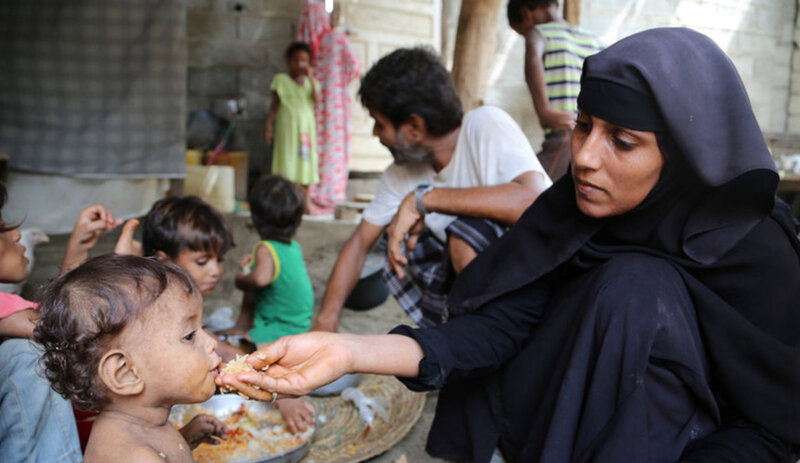Since the popular uprisings in Yemen broke out in early 2011, the United Nations has been engaged, through the good offices of the Secretary-General, in helping Yemenis to find a peaceful solution. The United Nations provided support for the negotiations between the Government and the opposition, which resulted in the signing of the Gulf Cooperation Council (GCC) Initiative and its Implementation Mechanism in Riyadh on 23 November 2011. The United Nations has since remained actively engaged with all Yemeni political groupings to promote peace and stability through dialogue and negotiations in accordance with Security Council resolutions 2014 (2011), 2051 (2012), 2140 (2014) and 2216 (2015). Most recently, the Security Council addressed the role of the Special Envoy in its resolution 2691 (2023).
To ensure the full and effective implementation of Security Council resolutions 2014 (2011) and 2051 (2012), together with the political transition agreed in November 2011 under the GCC Initiative and its Implementation Mechanism, the Secretary-General established the Office of the Special Envoy to the Secretary-General on Yemen in 2012. Since then, the United Nations has provided support for the Yemeni-led political transition process and has promoted inclusive participation, including of previously marginalized groups, such as women, youth, the Houthis and Southern Hiraak. With the support and facilitation provided by the United Nations, Yemenis concluded a National Dialogue Conference in January 2014, which brought together 565 delegates from all the regions and political groupings of Yemen. The outcome document of the National Dialogue Conference established the foundations for a new federal and democratic Yemen, with support for good governance, the rule of law and human rights. A Constitution Drafting Commission was created to draft a new constitution based on the National Dialogue Conference outcomes.
Despite important progress in the political transition, conflicts between government forces, the Houthis and other armed groups after the finalization of the draft constitution and power-sharing arrangements led to an escalation of military violence in mid-2014. Notwithstanding agreements brokered by the then United Nations Special Adviser, the Houthis and allied units of the armed forces seized control of Sana’a and other parts of the country in September 2014 and the ensuing months.
The United Nations facilitated numerous rounds of negotiations to resolve the political impasse, but these efforts were ineffective in halting the military escalation that continued in early 2015. At the request of President Abd Rabbuh Mansour Hadi, a coalition of countries led by Saudi Arabia intervened militarily on 26 March 2015 in support of the Government of Yemen. More than six years of fighting between Coalition-backed forces and pro-Houthi forces on several fronts has led to thousands of civilian casualties, destruction of infrastructure and a large-scale humanitarian emergency.
In the second half of 2018, the Government of Yemen, supported by the Saudi-led Coalition, began a significant military offensive against the Houthis to seize control of Hudaydah and its ports, the main entry point for humanitarian assistance and commercial trade for the country. In an effort to avert a military attack on the area in December 2018, the Stockholm Agreement was reached by the Yemeni parties, including a ceasefire in Hudaydah governorate, leading to the establishment of the United Nations Mission to support the Hudaydah Agreement (UNMHA) in January 2019.
Political tensions between the Government and southern groups also increased, leading to deadly outbreaks of violence in Aden and elsewhere in the South. In November 2019, the Riyadh Agreement brokered by Saudi Arabia was signed by the Government and the Southern Transitional Council (STC) – a southern separatist group – in an attempt to bring to an end to the instability in southern Yemen, but its implementation was limited. The overall security situation remained highly volatile.
Secretary-General António Guterres has repeatedly reiterated that there is no military solution to the Yemeni crises and has called for a return to peaceful negotiations.
In its resolution 2216 (2015), the Security Council requested the Secretary-General to intensify his good offices role in order to enable the resumption of a peaceful, inclusive, orderly and Yemeni-led transition. Since then, the United Nations has facilitated successive rounds of consultations aimed at obtaining a negotiated settlement to end the conflict and resume the political transition process, including direct talks in Switzerland in June and December 2015, in Kuwait from April to August 2016, and in Sweden in December 2018.
A new Special Envoy was appointed by the Secretary-General on 6 August 2021 to continue exercising his good offices role. The overall aim of the Office of the Special Envoy of the Secretary-General for Yemen is to provide support to the Yemen peace process, and the implementation of any eventual agreements to enable the resumption of a peaceful, inclusive, orderly and Yemeni-led transition. In line with resolution 2216 (2015) and the letter from the Secretary-General to the Security Council dated 24 May 2016 (S/2016/488), the Special Envoy will mediate between the parties, with a view to ending the conflict.
In April 2022, the Yemeni parties agreed to a UN-brokered, renewable truce in Yemen, which led to a significant reduction in violence. Despite its formal expiration in October 2022, the overall military situation has remained relatively stable. In December 2023, the Yemeni parties agreed to commitments on the implementation of a nationwide ceasefire, payment of public sector salaries, resuming oil exports, opening of roads in Taiz and other parts of Yemen, and further easing of restrictions on Sana’a Airport and Hudaydah Port. As of early 2024, the Special Envoy continues to engage the parties to establish a roadmap for the implementation and operationalization of these commitments, whilst also attempting to ensure that regional tensions do not derail efforts to reach a political settlement in Yemen. Ongoing military activities by the Houthis in the Red Sea, and related international military responses in Yemen, further complicate this situation as of early 2024.
After more than eight years of armed conflict, a stalled transition process and a severe economic decline that has accelerated the collapse of essential basic services and institutions, Yemen remains in the grip of a protracted political, humanitarian and developmental crisis. The country is facing one of the world’s largest humanitarian crisis, with 18.2 million in need of humanitarian aid and protection, and 4.5 million people remain displaced. Approximately 17.6 million people are food-insecure while famine remains a serious threat. Yemen faces an alarmingly high malnutrition rate, with nearly half of all children under five suffering from moderate to severe stunting. Erratic payment of public sector salaries is contributing to the collapse of public institutions that provide healthcare, water, sanitation and education.


